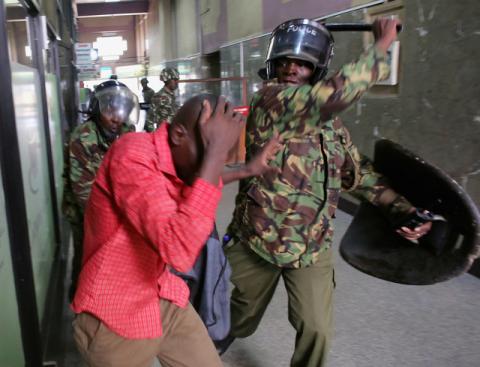Advertisement
Kenya government urges critics not to protest over electoral body
NAIROBI (Reuters) - Kenya's government called on its opponents on Thursday not to stage street protests against an electoral oversight commission that they accuse of bias, after three demonstrations in less than a month led to clashes with police.
On Monday, police fired teargas and water cannon at protesters outside the Nairobi offices of the Independent Electoral and Boundaries Commission (IEBC). Some officers with batons pursued protesters, beating and kicking them.
A few demonstrators had thrown stones.
"There are legal, constitutional and progressive ways of addressing issues without violence and shedding blood through demonstration," Deputy President William Ruto said in comments made in the northeast of Kenya and released in a statement.
The United States, Kenyan activists and international rights groups have condemned the police action. U.S. Ambassador Robert Godec said security services used excessive force.
Western diplomats have urged the authorities and citizens to prepare carefully for presidential and parliamentary elections due in August 2017, in a nation where ethnic fighting followed the 2007 vote and the 2013 result was disputed via the courts.
The opposition, led by Raila Odinga who unsuccessfully challenged the 2013 result and is expected to run again, has promised more protests. It blamed police for the violence. The police said they would investigate officers who broke the law.
The IEBC was set up under the 2010 constitution, drawn up in the wake of the post-2007 election violence in which 1,200 people were killed. Voting in Kenya is largely guided by ethnic loyalties rather than political allegiances.
The opposition has sought talks to reform the commission.
"I have no powers to disband IEBC," said President Uhuru Kenyatta, who is expected to seek a second and final term in 2017. "I took an oath to defend the constitution and will not break the law nor allow others to do so."
The commission oversees elections in Kenya, including ensuring voter lists are up to date and supervising counting.
Critics say the IEBC lacks the neutrality needed to referee a fair vote and wants it scrapped. IEBC members deny the charges.
One way to disband the IEBC would be via a public petition seeking the support of parliament, where Kenyatta's coalition has a majority.
(Writing by Edmund Blair; Editing by Gareth Jones)



















Add new comment